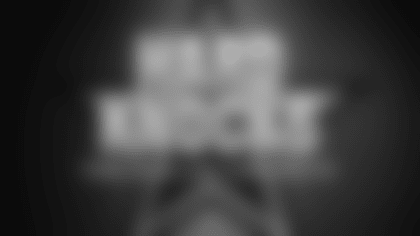FRISCO, Texas – Finally, a sense of direction.
This week's landmark deal with Dak Prescott was exciting for a variety of reasons. The Cowboys secured the services of their franchise quarterback for the next four years, and they did so in a manner that shouldn't hurt their financial flexibility in the long-term.
It also allows them to get moving on the here and now.
Ever since the 2020 season ended, it's felt like things have been stuck – as if someone pressed the pause button on the Cowboys organization. Prescott's contract status was the biggest priority of the offseason, and considering the astronomical cost of that contract, it was a status that had to be resolved before anything else could happen.
Well, it's happened. And the other dominoes have already started falling.
The same day that Prescott signed his contract, the Cowboys triggered clauses in several other contracts to buy themselves some cap space. It's a tactic the front office has employed for years, converting large salaries into signing bonuses, which allows them to spread those cap hits over multiple years and free up space on the current year's cap.
With the 2021 salary cap set at $182 million, the Cowboys pressed a few buttons and re-structured the deals of Tyron Smith, Zack Martin and La'el Collins, buying themselves roughly $17 million.
With free agency set to open next week, the Cowboys are sitting on roughly $19 million in salary cap space – largely thanks to Prescott's cap hit of $22 million, a significant dip from the $37.7 million he would have cost on the franchise tag.
"When it comes to the cap, as I said, I think we've got the resources to do under the cap what we need to do to put a defense out there with Dak and the offense to be a championship team," said Cowboys chief operating officer Stephen Jones on Wednesday.
What does that look like exactly, though? The Cowboys have not been big spenders in free agency in recent years, and that doesn't look likely to change now.
They've never been overly shy about that. For most of the past decade, the Cowboys have preferred to find their big pieces through the NFL draft. Asked about acquiring defensive talent on Wednesday, Jones alluded to that fact himself.
"We do believe we can manage through this and really improve our defense, and obviously the heart and soul of any team is the draft," he said.
His logic is even more sound than usual. One of the few silver linings of a 6-10 record is the No. 10 overall draft pick that goes with it. In total, they have 10 picks to use on the rest of their roster, highlighted by a pair of compensatory picks received for Byron Jones and Robert Quinn – No. 99 and No. 138 overall. The Cowboys currently hold four picks in the draft's Top 100, and six picks in the first four rounds.
"I think we've got one of the best in the business in Will McClay and his scouting group and they're going to do a tremendous job I think of helping us find defensive players," Jones said. "Now, you've got to be open minded or you don't get CeeDee Lamb if he happens to be sitting there. At the same time, I think through the draft is obviously a great way for us to improve our team."
Obviously, it can't all be done through the draft. Just like everyone else in the league, the Cowboys make free agent acquisitions every offseason – though the impact of those additions has been minimal at best.
The front office showed a willingness to invest a bit more in 2020, setting off the first year of Mike McCarthy's coaching tenure. The Cowboys signed Gerald McCoy to a three-year, $18.3 million contract, and they added fellow veterans Dontari Poe and HaHa Clinton-Dix to deals worth $9 million and $3.75 million, respectively.
These contracts certainly weren't huge by NFL free agency standards, but they were larger than what the Cowboys have customarily given recently – especially for two defensive tackles and a safety, positions the team has been unwilling to invest large sums on in the past.
The irony, of course, is that none of those moves panned out. McCoy tore his quad at the outset of training camp and was eventually released. Clinton-Dix was cut when the team pared its roster down at the end of camp. Poe was released at the midpoint of the season after struggling to make an impact on an atrocious defense.
Now, the question is: how much will those failures affect their strategy this year? The Cowboys need talent, particularly on the defensive side of the ball. Longtime starters and key contributors like Chidobe Awuzie, Xavier Woods, Jourdan Lewis and Aldon Smith will all hit the open market next week. Even a loaded draft class can't replace all of that production alone.
Jones seemed to acknowledge that, as well – and again, it only further emphasizes the importance of Prescott's deal. If the Cowboys were heading into a new league year with their quarterback on a $38 million franchise tag, they'd be maneuvering to simply stay under the salary cap, rather than identifying pieces to add.
"Based on how we negotiated this contract with Dak and Todd, it gives us the opportunity to do some things to continue to improve on the defensive side of the ball," he said. "Which, as we saw last year, it's real hard to outscore them in this game. We've got to be better on the defensive side of the ball."
Despite all of this, history suggests the Cowboys won't be major players in free agency. But signing their quarterback gives them the flexibility to even play at all. With that all-important first step out of the way, it feels much easier to see their path toward the 2021 season.















